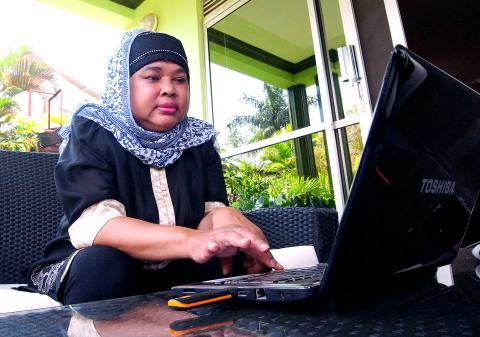Sitting at a table in a run-down bar on the edge of the Ugandan capital, Kampala, Stella Kobusingye stares into the distance as she recalls the tangle of lies and deceit that led to her sex-slavery ordeal.
Struggling to support her young son and sickly mother with the income from a small shop, last year Kobusingye heard about a job opportunity earning US$800 a month working at a Ugandan-owned boutique in Malaysia.
After double and then triple-checking that the job seemed genuine, Kobusingye sold her shop, paid for a passport and bought a visa for China, where middlemen told her she needed transit, before being handed a ticket and boarding a plane.

Photo: AFP
However, when she arrived in China, she was met by a Ugandan woman, taken to a hotel where scores of other Ugandan girls were staying and told she now owed US$7,000 for the airfare.
“There were no jobs there, they had lied to me — the only thing they had taken me there for was prostitution,” said Kobusingye, who asked for her name to be changed.
That night, a Nigerian man knocked on the door and said he had paid to have sex with her. Kept prisoner in her hotel room and with her passport taken away, for the next few weeks Kobusingye was forced — sometimes brutally — to sleep with up to five Nigerian men each night.
To scare her into silence, Kobusingye says her captors took her to a Ugandan witchdoctor there who used her fingernails and pubic hair to perform rituals.
Kobusingye’s story is typical of a growing number of young and vulnerable Ugandan women whom officials say are being duped into traveling abroad — particularly to countries in the Far East and Middle East — and then forced into prostitution.
In a country with massive unemployment, posters in shopping malls around Kampala advertise opportunities for well-paying jobs or studies abroad.
It is almost impossible to say how many Ugandan girls have been trafficked abroad, but officials estimate in Malaysia alone — a country with visa-free travel for Ugandans and growing economic ties — there are currently about 600 Ugandan women in forced prostitution.
During a recent visit to Kampala, Hajah Noraihan, a Malaysian working as Uganda’s honorary consul in Kuala Lumpur, flicked through a series of horrifying pictures to show what happens to the girls who refuse — the face of a young woman thrown from a third-floor balcony, the body of another brutally murdered on a bedroom floor.
In the past two years, at least three Ugandan girls have been killed in Malaysia, she said.
Since late last year, Malaysian police have cracked down on the prostitution rings. In a single raid in October, 21 Ugandan women were discovered at just one location and there are about 60 being detained by Malaysian authorities. With the help of the International Organization for Migration, in the past five months 14 girls have been brought back to Uganda, Noraihan says.
Now Noraihan, a native of Kuala Lumpur, is pressing authorities in Uganda to deal with the problem at its source.
“We really need to see action on this, not just talk, not just reports. We need to see action on it and now,” she says.
That pressure seems to be paying off.
Although several of those suspected of trafficking girls to Malaysia have already been arrested, critics say authorities have been sluggish or too poorly funded and trained to effectively crack down on those behind the rings.
Now, though, officials from the immigration department to law enforcement agencies and presidential advisers have started meeting on the issue and a group of lawmakers is pushing to visit Malaysia to investigate further.
However, public awareness of the threat remains perilously low and the trafficking rings are highly organized and increasingly sophisticated, said Asan Kasingye, director of the Interpol office in Kampala.
“The criminals, these international rings, they are also working against us. Instead of taking 10 girls, they might take one a week and if you go to the airport and there is a person going to Malaysia she will have documents saying she is going for studies,” Kasingye said.
Uganda is just one of many sub-Saharan countries affected by sex trafficking. Other countries affected include South Africa, Nigeria, Malawi, Cape Verde, Zimbabwe, Kenya, Tanzania and Zambia.

Nauru has started selling passports to fund climate action, but is so far struggling to attract new citizens to the low-lying, largely barren island in the Pacific Ocean. Nauru, one of the world’s smallest nations, has a novel plan to fund its fight against climate change by selling so-called “Golden Passports.” Selling for US$105,000 each, Nauru plans to drum up more than US$5 million in the first year of the “climate resilience citizenship” program. Almost six months after the scheme opened in February, Nauru has so far approved just six applications — covering two families and four individuals. Despite the slow start —

North Korean troops have started removing propaganda loudspeakers used to blare unsettling noises along the border, South Korea’s military said on Saturday, days after Seoul’s new administration dismantled ones on its side of the frontier. The two countries had already halted propaganda broadcasts along the demilitarized zone, Seoul’s military said in June after the election of South Korean President Lee Jae-myung, who is seeking to ease tensions with Pyongyang. The South Korean Ministry of National Defense on Monday last week said it had begun removing loudspeakers from its side of the border as “a practical measure aimed at helping ease

DEADLY TASTE TEST: Erin Patterson tried to kill her estranged husband three times, police said in one of the major claims not heard during her initial trial Australia’s recently convicted mushroom murderer also tried to poison her husband with bolognese pasta and chicken korma curry, according to testimony aired yesterday after a suppression order lapsed. Home cook Erin Patterson was found guilty last month of murdering her husband’s parents and elderly aunt in 2023, lacing their beef Wellington lunch with lethal death cap mushrooms. A series of potentially damning allegations about Patterson’s behavior in the lead-up to the meal were withheld from the jury to give the mother-of-two a fair trial. Supreme Court Justice Christopher Beale yesterday rejected an application to keep these allegations secret. Patterson tried to kill her

CORRUPTION PROBE: ‘I apologize for causing concern to the people, even though I am someone insignificant,’ Kim Keon-hee said ahead of questioning by prosecutors The wife of South Korea’s ousted former president Yoon Suk-yeol yesterday was questioned by a special prosecutor as investigators expanded a probe into suspicions of stock manipulation, bribery and interference in political party nominations. The investigation into Kim Keon-hee is one of three separate special prosecutor probes launched by the government targeting the presidency of Yoon, who was removed from office in April and rearrested last month over his brief imposition of martial law on Dec. 3 last year. The incident came during a seemingly routine standoff with the opposition, who he described as “anti-state” forces abusing their legislative majority to obstruct